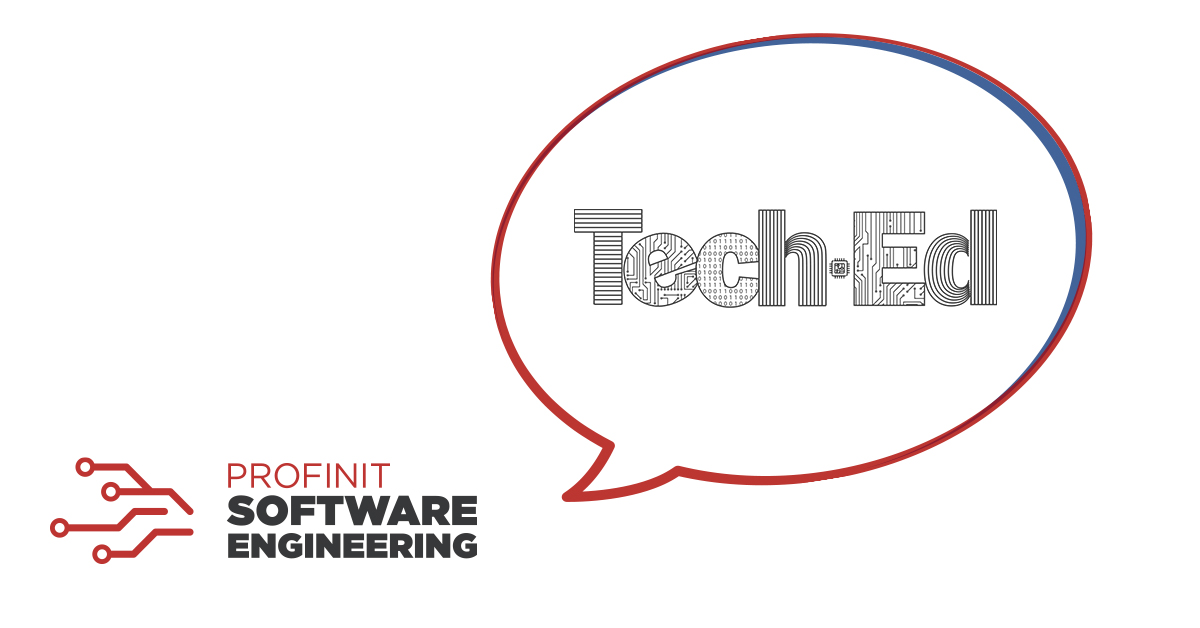TechEd is a purely Czech, professional conference where IT experts share information about what’s new in the world of IT, and this was their 18th annual event. As in previous years, Profinit was a conference partner, so my colleagues and I couldn’t miss it.
What was different from previous years was that this year’s conference was affected by the COVID-19 pandemic, so it was held online. The number of contributions was smaller than last year, but even so, the selection was sufficiently diverse. Typically, the lectures are divided up into several streams, which occur in parallel in different lecture halls. Last year, there were three streams (IT, DEV, DB), this year, two (IT and DEV). Although this year’s concept was less personal, the advantage of the online format was that visitors could watch all the lectures from the recordings, even those that ran in parallel. The recordings were available immediately after the end of each speech.
Our domain, as well as the .NET developers, gave a selection of lectures in the DEV category, which mainly focused on .NET Core, although a few of them did not, such as those on IoT, Xamarin, No SQL DB and my colleague’s lecture on self-documenting code. But more about that in a moment. The second stream, called IT, was technologically diverse and mainly focused on security (with the subtitle “stop ransomware”) and was supplemented by several other lectures on MSSQL and licensing.
“Le roi est mort, vive le roi!” (The king is dead, long live the king!) This quote kicked off the first lecture from the world of .NET. After a year, it has again been confirmed that .NET Framework 4.8 is really the last full version of .NET framework and it will not be further developed; however, it will still be supported for some time. Once again, this has led me to think about the systems that we have been maintaining for our customers for several years that run on this platform. I wonder what time will bring and how it will be in the future. The lecture reaffirmed for me that everything new should be created in .NET Core and, at the same time, piqued my curiosity regarding the upcoming .NET 5, which should unify the runtime of both frameworks. The lecture then moved on to C# 8.0 language constructs and exciting news from ASP.NET Core.
Another interesting lecture, which was an excellent follow-up to the previous one, was on the upcoming .NET 5 and planned innovations to C# 9.0. The other talks were more specialized and focused on specific topics in greater detail. For me, the most exciting topics were things like asynchronous programming and the most common mistakes made when using it, .NET Core configurations, gRPC and web topics such as creating tag helpers and working with static files in ASP.NET Core.
However, I would also like to say something about the topics from the second lecture hall, in which I, as a developer, also found very valuable contributions. Everyone who works in their database systems (which will probably be the majority) should listen to the lecture on optimistic concurrency. For me, the talk on data encryption in MSSQL was very stimulating. Although the ransomware topics were not directly intended for .NET developers, I think they were a pleasant distraction for them and contained a lot of new information.
Finally, I would like to mention the lecture on self-documenting code by my colleague Radoslav Zápotocký. He very aptly described what well-written code should look like and refuted the mistaken assumption that self-documenting means without any documentation. Although this is a topic that can be very extensive and may seem trivial to some, the lecture offered useful tips on how to improve code with minimal effort significantly. Every programmer should try to write well-organized code, avoid using magic constants, and accompany it with quality documentation unless the meaning of the code is evident at first glance. Although it may be a matter of course for some, which is good, unfortunately, we still encounter code where these basic principles are violated. You can read an interesting article on self-documenting code here.
What can I say in conclusion? We were delighted with the conference program, and we evaluate it very positively. The program is very diverse every year, and I would recommend the conference to any .NET developer. I am already looking forward to next year and wondering what news Microsoft and the .NET community will have for us.
Author: Miroslav Piroh
Project Manager & Developer
